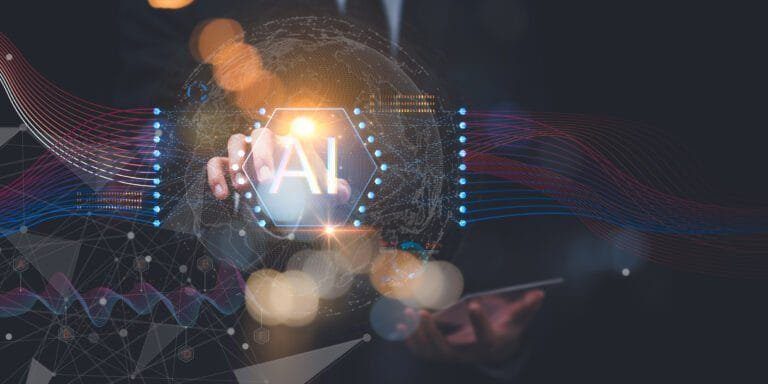your all-in-one omni-channel platform for smart messaging and human-like voice engagement.
FinBridge leverages AI and ML to streamline operations and support modern banks, fintechs, and financial service providers.
Current Impact & Future
September, 15, 2025
Artificial Intelligence (AI) has already become an essential part of modern banking, but the real game-changer is the rise of AI agents. Unlike traditional AI models that respond only when prompted, AI agents act with autonomy—they observe, reason, and carry out tasks without continuous human input.
From customer service chatbots to fraud prevention systems and authentication tools, AI agents are transforming the global banking landscape. According to multiple industry reports, the financial sector is expected to invest tens of billions of dollars annually in AI-driven technologies by 2030, with AI agents becoming central to this evolution.
This article provides a global overview of how AI agents are reshaping banking, highlights verified statistics, and shares future predictions that every bank executive and fintech leader should know.
AI agents are autonomous software systems designed to achieve goals within dynamic environments. In banking, this could mean
Monitoring transactions and flagging fraud in real time
Handling multi-step customer requests without human intervention
Automating regulatory reporting and compliance checks
Verifying customer identity through layered authentication
The distinction between AI agents and traditional AI is important
Traditional AI → Executes specific rules (e.g., fraud filters).
Generative AI → Creates outputs when prompted (e.g., chatbot replies).
AI Agents → Act autonomously, adapting and learning in real time to achieve outcomes.
This autonomy is what makes them so powerful—and disruptive—in global financial services.
Banks such as JPMorgan, HSBC, and Standard Chartered already deploy AI-driven virtual assistants. These AI agents don’t just answer FAQs; they
Handle onboarding of new customers
Assist with loan applications
Provide financial advice tailored to spending patterns
Speak multiple languages for global customer bases
For example, Bank of America’s Erica AI agent has served over 37 million customers, processing over 1 billion requests annually.
Fraud costs the global banking sector billions every year. AI agents use advanced machine learning to
Track real-time transactions across millions of accounts
Flag unusual spending patterns instantly
Detect money laundering (AML) activities
Improve credit risk assessment models
This proactive monitoring means fraud is caught before damage occurs, saving both banks and customers.
AI agents streamline repetitive tasks like
Know Your Customer (KYC) verifications
Loan processing and approvals
Document scanning and compliance reporting
Internal process automation
According to an RBI study (2025), generative AI and agentic systems could bring up to 46% efficiency gains in Indian banks alone. Globally, the impact is even larger.
Authentication is one of the most critical areas where AI agents are making a difference. Traditional static security checks (passwords, PINs, one-time passwords) are increasingly insufficient.
AI-driven authentication includes:
Biometric verification: fingerprints, facial recognition, voice ID
Behavioral analytics: keystroke dynamics, transaction habits
Continuous authentication: monitoring behavior throughout a session
Adaptive multi-factor security: combining biometrics, device trust, and geolocation
This multi-layered approach allows banks to fight deepfakes, identity theft, and voice cloning attacks, which are projected to grow sharply by 2027.
Gartner predicts that by 2028, 33% of enterprise apps will include agentic AI, compared to less than 1% in 2024. This means AI agents will become a default component of banking platforms, not an add-on.
Due to rising deepfake and biometric spoofing threats, static systems (like simple voiceprints) will be obsolete. Banks will adopt zero-trust frameworks, continuous monitoring, and even decentralized identity systems (blockchain-based verifiable credentials).
According to a Financial News London report, banks could gain an additional USD 170 billion in profits globally within five years, driven by AI agents’ efficiency and fraud reduction.
By 2026–2028, regulators will demand AI systems to be transparent, explainable, and auditable. This will likely result in new compliance frameworks for AI in finance, similar to Basel III for banking risk.
Security Risks: Deepfakes and voice cloning create vulnerabilities in biometric systems.
Bias & Fairness: AI agents trained on biased data could cause discrimination in loan approvals.
Explainability: Regulators and customers will demand to know why an AI agent made a decision.
Data Privacy: With stricter GDPR-like regulations globally, AI must balance personalization with compliance.
Legacy Integration: Older banking infrastructure will require upgrades to handle real-time AI agent deployment.
The transformation is not limited to one region.
North America & Europe: Leading in AI adoption with regulatory oversight.
Asia-Pacific (APAC): Fastest growth region, with China and India investing heavily in agentic AI for banking.
Middle East & Africa: Banks are leapfrogging legacy infrastructure, directly adopting AI-driven systems.
By 2030, AI agents will be ubiquitous in banking worldwide, reshaping the way customers interact with financial services.
AI agents are transforming banking on a global scale. From smarter customer service to next-gen authentication and fraud prevention, their role will only grow. Banks that invest now in ethical, secure, and explainable AI agent systems will gain not only efficiency but also customer trust in an increasingly digital world.
The future of banking is autonomous, intelligent, and secure—and AI agents are at its core.
Servixon helps financial institutions harness AI agents to drive intelligent banking transformation across customer service, risk management, fraud detection, compliance, credit scoring, and operational efficiency, ensuring secure, seamless, and scalable growth in the digital era









How we can help?
Servixon values your privacy and allows you to choose the types of cookies we use when you visit our website. You can use the "Manage Settings" option in the banner to customize your cookie settings. Cookies help us enhance your browsing experience, improve the website's performance, deliver relevant content, and enable sharing on social networks. Please note that disabling certain cookies may affect your browsing experience and limit the availability of some features. Your choices will be saved by Servixon for a duration of 3 months, after which you will need to set your preferences again. For a detailed list of cookies used in each category, please refer to our Cookie Policy.